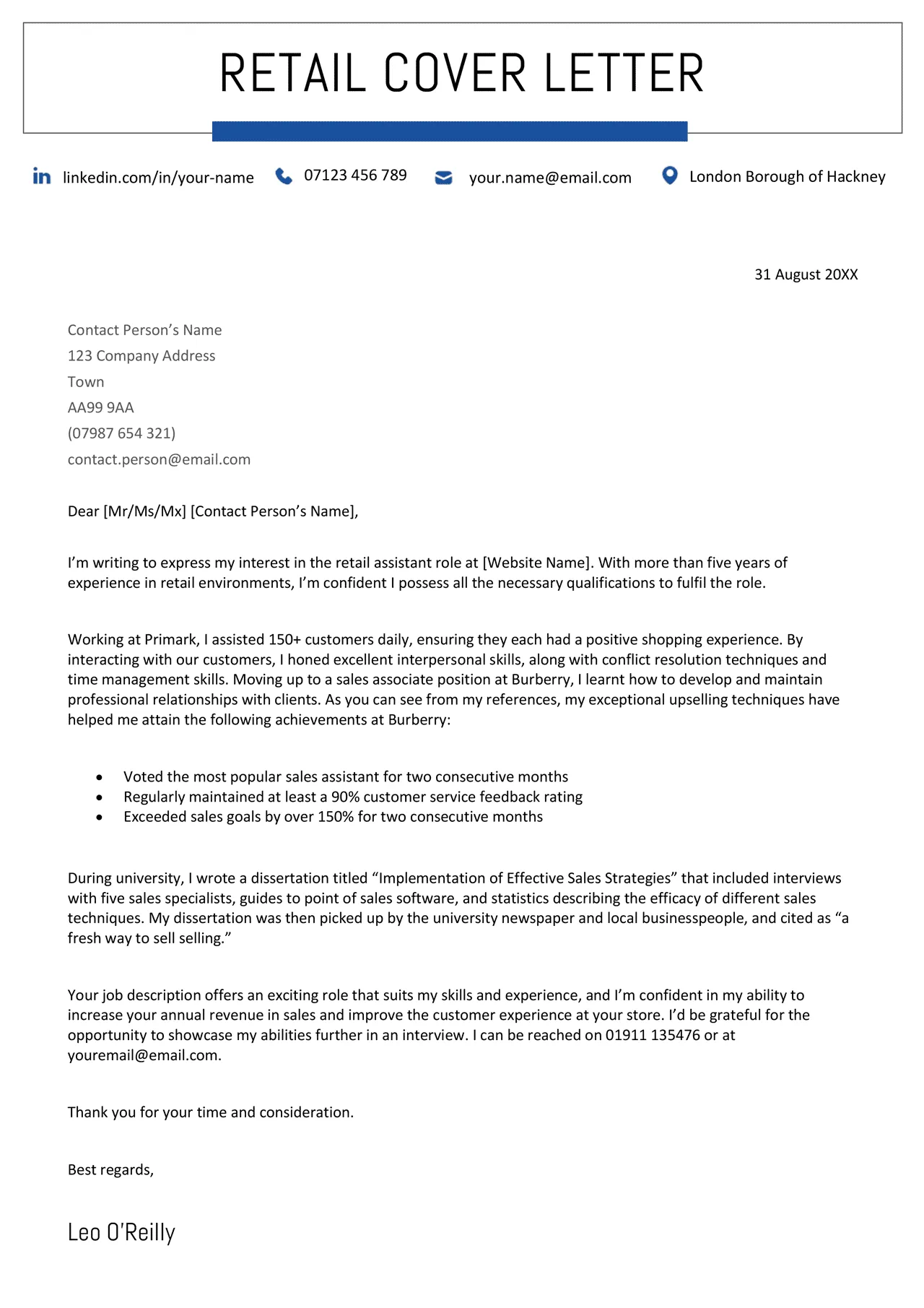Crafting a Winning Retail Sales Cover Letter
A retail sales cover letter is your initial introduction to a potential employer. It’s your opportunity to make a strong first impression and demonstrate why you’re the ideal candidate for the retail sales position. Unlike a resume, which provides a factual overview of your work history, a cover letter allows you to express your personality, enthusiasm, and explain how your skills align with the specific requirements of the job. A well-crafted cover letter significantly increases your chances of getting noticed and securing an interview. Its purpose is to showcase your suitability for the role and your genuine interest in joining the company. This is a chance to shine and to be at the front of the line.
Understanding the Purpose of a Cover Letter
The primary purpose of a retail sales cover letter is to persuade the hiring manager to read your resume and consider you for an interview. It’s not just a formality; it’s a strategic tool to highlight your key qualifications and demonstrate your understanding of the role. Think of it as a personal sales pitch, where you’re selling yourself and your abilities. A cover letter also allows you to provide context to your resume, explaining any gaps in your employment history or highlighting specific experiences that make you a great fit. Furthermore, it demonstrates your written communication skills, which are crucial for effective customer service and sales interactions. A compelling cover letter helps you stand out from other applicants.
Highlighting Your Skills and Experience
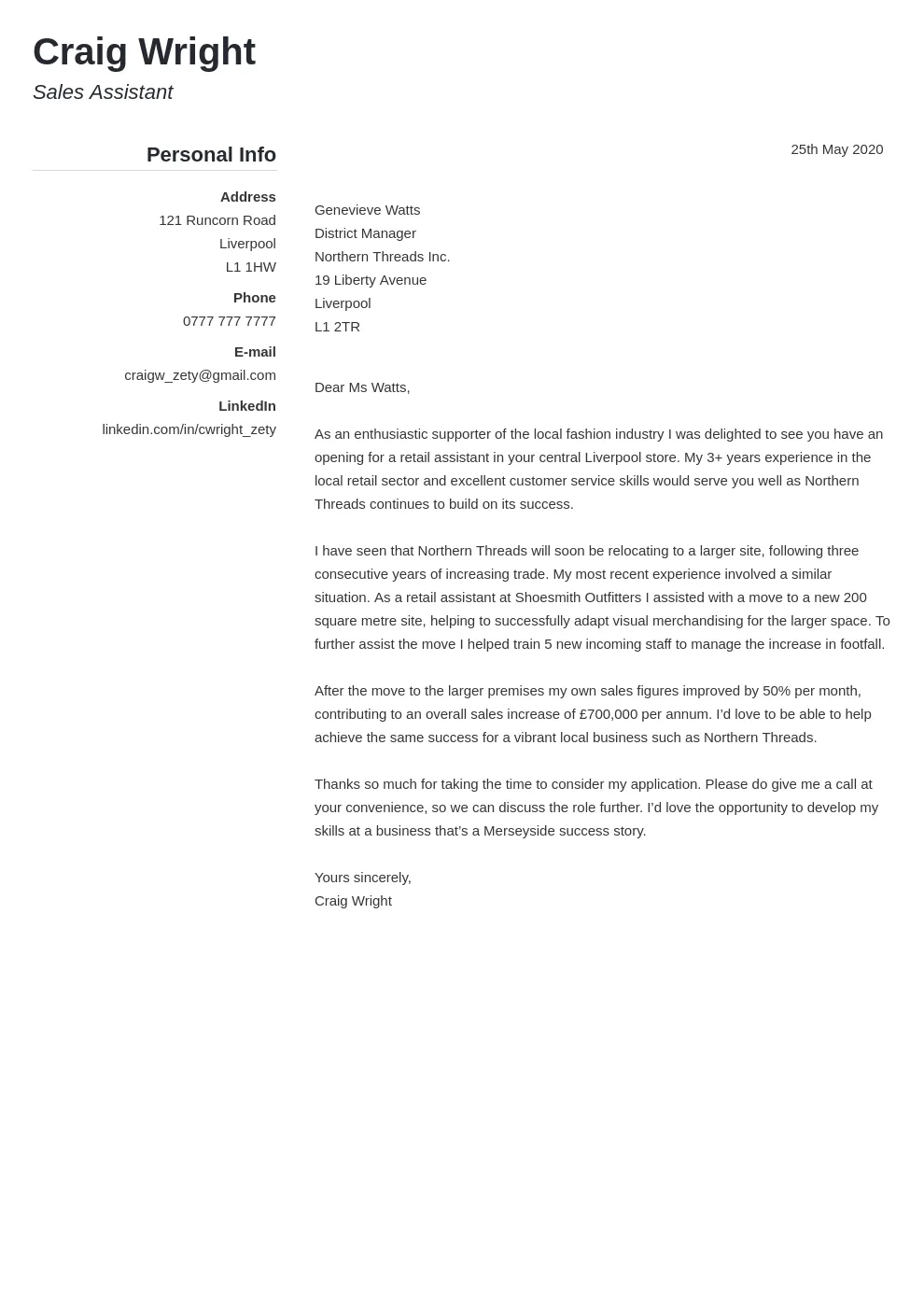
When crafting your retail sales cover letter, you must emphasize the skills and experience most relevant to the job. This requires careful analysis of the job description to identify the key requirements and tailor your letter accordingly. Common skills to highlight include excellent communication, active listening, customer service, sales, and the ability to work well under pressure. Focus on the skills most valuable to a retail environment. You should also discuss your ability to handle customer inquiries, resolve complaints, and process transactions efficiently. Your cover letter is the perfect place to showcase these skills. It allows you to draw attention to your strengths and explain how they make you a perfect candidate.
Showcasing Relevant Work History
Clearly and concisely outline your relevant work history in your cover letter. Focus on positions where you’ve directly engaged in retail sales or customer service. When describing your past roles, focus on your responsibilities and accomplishments. Don’t just list job duties; instead, describe what you achieved in each role. Mention specific sales targets you met or exceeded, customer service awards you received, or any instances where you improved sales figures or customer satisfaction. Provide evidence of your achievements in previous roles. Highlight experiences such as working in a fast-paced environment, handling cash transactions, and working as part of a team, all of which are essential for success in retail sales. Also include information like your ability to use POS systems.
Quantifying Achievements and Results
One of the most impactful ways to make your cover letter stand out is by quantifying your achievements with specific metrics. Instead of simply stating that you increased sales, mention the percentage increase or the dollar amount. For example, ‘Increased sales by 15% within six months’ is more compelling than a generic statement. Use numbers to illustrate your impact. If you consistently exceeded sales quotas, provide the details. Did you receive positive customer feedback, describe the nature of this feedback? Did you reduce customer complaints by a certain percentage? Be as specific as possible. This approach not only demonstrates your accomplishments but also shows that you understand how your performance contributes to the company’s success. Use these metrics to highlight your value to the company.
Tailoring Your Cover Letter to the Job

A generic cover letter is unlikely to impress a hiring manager. It’s essential to tailor your cover letter to each specific job application. This requires carefully reviewing the job description and identifying the key skills and requirements. Use this information to customize your cover letter. Highlight the skills and experiences that directly match what the employer is looking for. Make sure to use keywords from the job description. Customize your letter to show how you fit the company’s needs. This demonstrates that you’ve taken the time to understand the role and the company, making it clear that you’re genuinely interested in the opportunity. Also include information on your ability to meet the requirements of the job. Show that you can make a great contribution to the company.
Researching the Company and Role
Before you start writing your cover letter, conduct thorough research on the company and the specific role. Visit the company’s website, read their mission statement, and learn about their products or services. Understanding the company’s values and goals helps you tailor your cover letter to resonate with their culture. Also, analyze the job description carefully to understand the role’s responsibilities and required skills. If possible, research the hiring manager or the team you would be joining. This information allows you to personalize your cover letter and demonstrate your genuine interest in the opportunity. It also allows you to match your qualifications to the job’s needs.
Matching Skills to Job Requirements
The heart of a tailored cover letter is aligning your skills and experience with the job requirements. Go through the job description and identify the key skills, experience, and qualifications. Then, in your cover letter, explicitly connect your skills to these requirements. Provide examples of how you have demonstrated these skills in previous roles. For instance, if the job description mentions the need for excellent communication skills, provide examples of how you have effectively communicated with customers or team members. The more directly you connect your qualifications to the job’s needs, the more compelling your cover letter will be. Make it clear that your skills match the requirements. You are directly addressing the requirements of the job by mentioning your skills.
Structuring Your Retail Sales Cover Letter
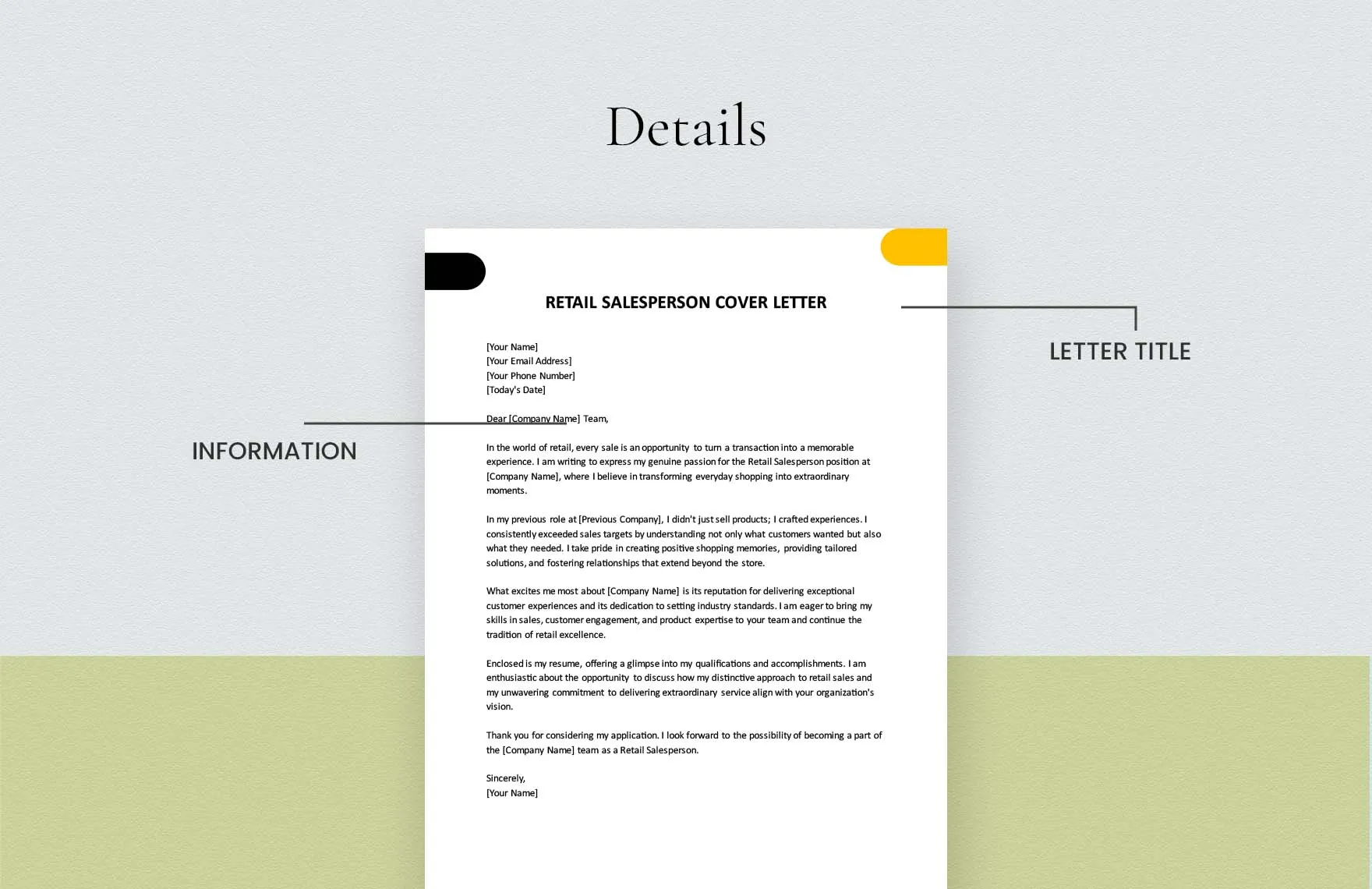
A well-structured cover letter is easy to read and makes a positive impression. Generally, a cover letter should follow a standard format: start with your contact information and the date, followed by the hiring manager’s name and title (if known). The body of your letter should include an opening paragraph, two or three body paragraphs, and a closing statement. Make sure the layout is neat and professional, with clear spacing and consistent formatting. The goal is to make your cover letter visually appealing and easy for the hiring manager to navigate. A well-structured cover letter helps guide the reader through your qualifications. Use proper spacing and formatting for clarity.
Writing a Compelling Opening Paragraph
Your opening paragraph is your chance to grab the hiring manager’s attention. Start with a strong hook that immediately states your interest in the role and the company. Briefly mention where you saw the job posting and why you’re excited about the opportunity. Immediately state your name, and the specific position you are applying for, and provide a brief overview of your qualifications. The first few sentences should make a strong first impression. Avoid generic openings; instead, tailor your introduction to the specific job and company. Show your enthusiasm and eagerness to contribute to the company’s success. Make your opening paragraph memorable and engaging.
Developing Strong Body Paragraphs
The body paragraphs are where you showcase your skills, experience, and achievements. Use these paragraphs to elaborate on your key qualifications and demonstrate how they align with the job requirements. Provide specific examples to support your claims. In each paragraph, focus on a particular skill or experience, and back it up with concrete evidence. When describing your accomplishments, use the STAR method (Situation, Task, Action, Result) to provide context and show the impact of your actions. Keep your body paragraphs concise and to the point. Ensure that you show all the information that makes you the best candidate for the role.
Creating a Powerful Closing Statement
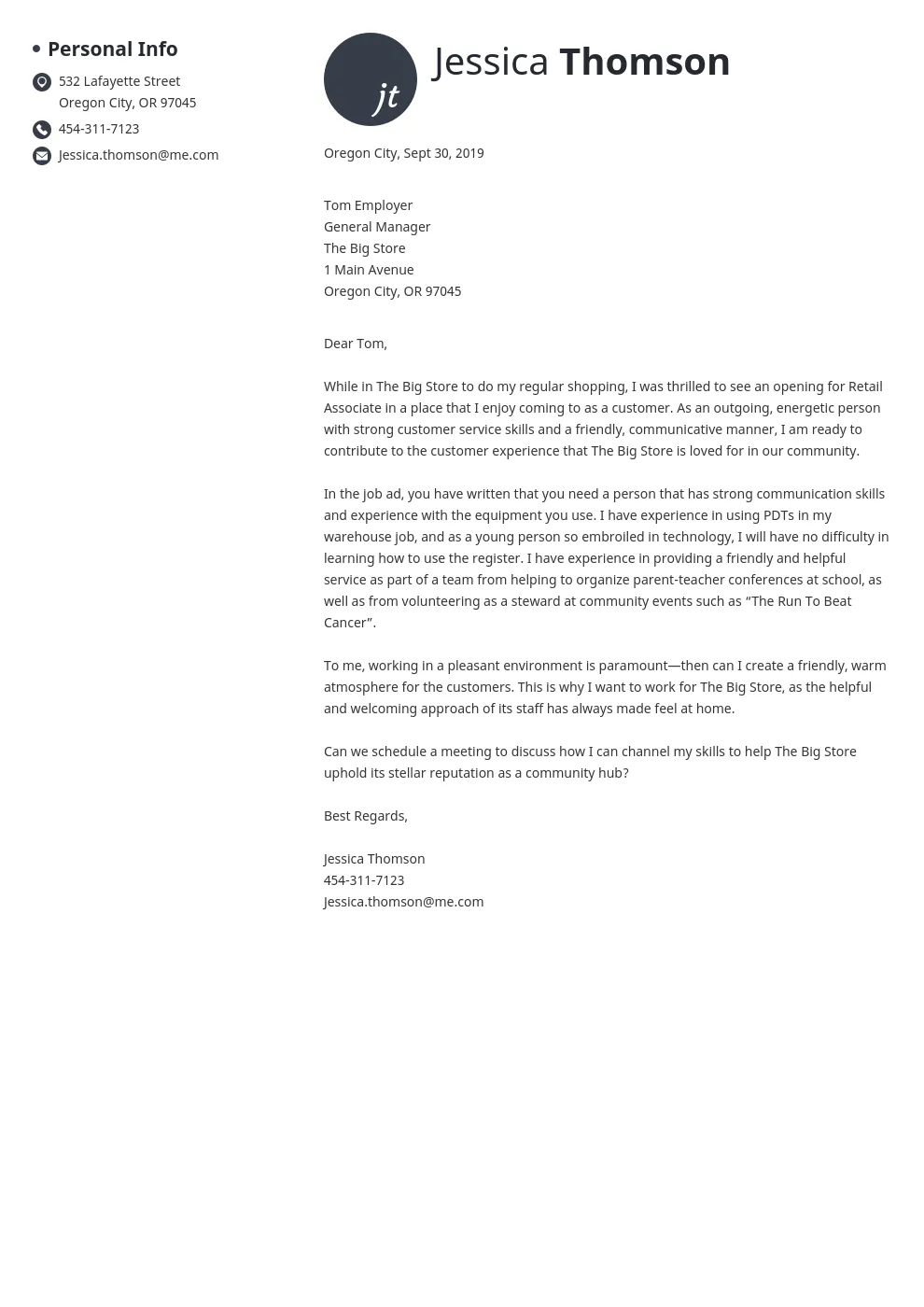
Your closing statement should summarize your interest in the role and reiterate your value as a candidate. Reiterate your enthusiasm for the opportunity and express your confidence in your ability to contribute to the company’s success. Thank the hiring manager for their time and consideration. Include a call to action, such as inviting them to contact you for an interview. Keep your closing statement brief and professional. It is your final opportunity to leave a positive impression and encourage the hiring manager to take the next step. Make sure to end on a positive and confident note.
Proofreading and Editing Your Cover Letter
Once you’ve written your cover letter, proofreading and editing are essential steps. A cover letter riddled with errors can undermine your credibility. Read through your letter carefully, and look for any grammatical errors, spelling mistakes, or typos. You should also check for clarity and conciseness, ensuring that your message is easy to understand. If possible, ask a friend or family member to proofread your letter as a fresh pair of eyes can often catch mistakes that you may have missed. Proofreading is a crucial step in ensuring your cover letter is professional. This is essential to show that you possess attention to detail, which is essential for a retail sales role.
Checking for Grammatical Errors
Grammatical errors can be a major turn-off for hiring managers. Carefully check your cover letter for correct grammar, including proper use of punctuation, subject-verb agreement, and sentence structure. Use a grammar checker tool. Also, read your cover letter aloud to catch any awkward phrasing or errors that you might miss when reading silently. Pay close attention to commonly misused words, such as ’there,’ ’their,’ and ’they’re.’ Ensuring your cover letter is grammatically sound will make your cover letter more professional. Correct grammar demonstrates a high level of professionalism. Avoid errors that can cost you the job.
Ensuring Clarity and Conciseness
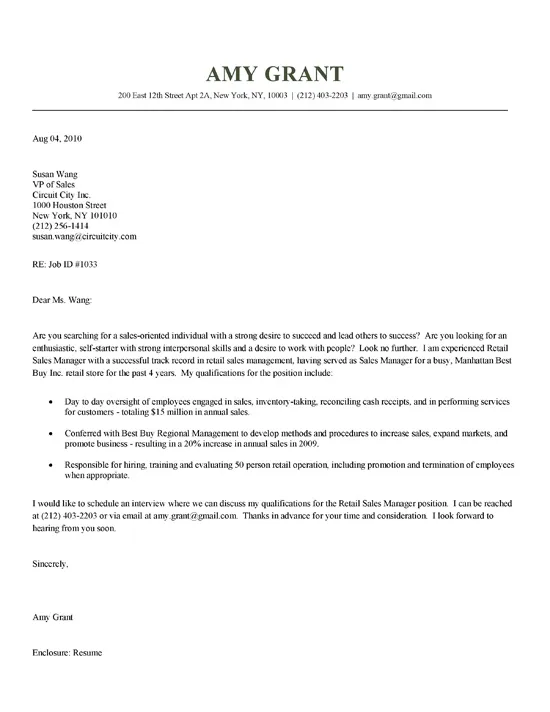
Clarity and conciseness are vital components of an effective cover letter. Make sure your writing is clear, easy to understand, and free from jargon or overly complex language. Avoid using long, convoluted sentences. Instead, use short, punchy sentences to convey your message clearly. Remove any unnecessary words or phrases that don’t add value to your letter. Be direct and to the point. Aim for a concise letter that gets straight to the point and focuses on your key qualifications. This increases the impact of your cover letter and makes it easier for the hiring manager to understand your value. This is also a great way to showcase your skills.
